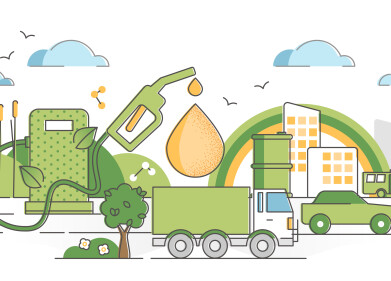Biofuel industry news
Biofuels 'will replace fossil fuels in the future'
Aug 06 2012
Biofuels are likely to replace fossil fuels in the future, according to University of Limpopo’s professor of biochemistry, microbiology and biotechnology, Emil Abotsi.
The South African university professor said as fossil fuels dwindle, a new era of biofuels is likely to commence, although this isn’t something that will happen tomorrow. In his biofuel analysis, he told SABC News: "We want to see biofuels replacing fossil fuels in the future. We want to see if we can replace fossil fuels with biofuels, but it’s not an immediate thing, we will start doing it and supplementing it gradually."
It is predicted that there are enough fossil fuels left on earth to last 60 years at current rates of consumption, which is why there has been considerable efforts by energy providers and researchers to enhance biofuel techniques.
Global warming research has also presented a big opportunity for cleaner energy alternatives. The effects of global warming have been particularly evident in places such as South Africa, where crop reserves have been wiped out because of long summers or flooding.
That is why Mr Abotsi and his team at the South African research facility are looking to harness their efforts in order to create a cleaner alternative to fossil fuels. Plant material will never be depleated, so biofuels also tick the sustainability box.
The researchers are looking to see how they can use different enzymes to produce biofuels. Plants consist of cellulose, which can be broken down into simple sugars to be fermented to produce alcohol (a biofuel/ bioalcohol).
Each country is taking this process from a different angle, but in South Africa, the researchers are looking to see what combination of enzymes can we have in order to break down these cellulose materials from plants and how can we produce it cheaply, the enzymes cheaply, cheaper for use in this process, Mr Abotsi explains.
However, the researchers are conscious that this could impact food supply in the country, which is why they are looking to deploy the same method to grass. If successful, this could be a globally accepted model which will help avoid food shortages such as the one America is currently suffering from.
Posted by Joseph Hutton
Digital Edition
PIN 25.6 Buyers' Guide
January 2025
Buyers' Guide Directory - Product Listings by Category - Suppliers Listings (A-Z) Articles Analytical Instrumentation - ASTM D7042: The Quantum Leap in Viscosity Testing Technology -...
View all digital editions
Events
Jan 20 2025 San Diego, CA, USA
Jan 22 2025 Tokyo, Japan
Jan 25 2025 San Diego, CA, USA
SPE Hydraulic Fracturing Technology Conference and Exhibition
Feb 04 2025 The Woodlands, TX, USA
Feb 05 2025 Guangzhou, China



















